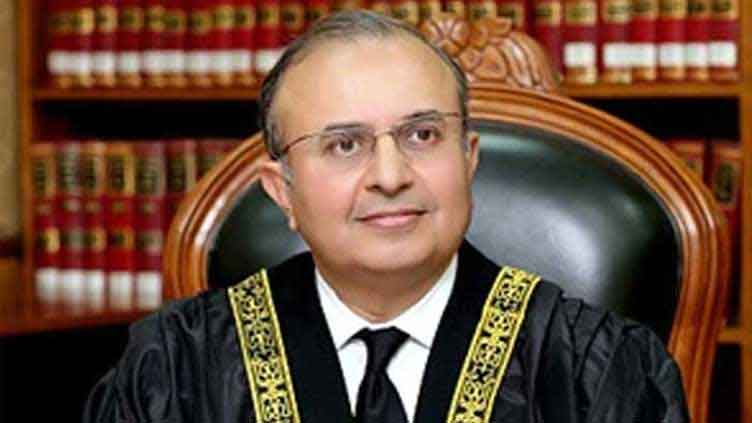Supreme Court’s Justice Mansoor Ali Shah on Monday issued a dissenting note for the verdict the court had given on September 15 annulling the amendments to the accountability laws and restoring corruption cases against public office holders.
Justice Shah, in his 27-page dissenting note, observed that members of the armed forces and judges were accountable under the accountability laws.
The judge noted that during the course of over 50 dates of hearings, a question was raised as to whether the judges of the constitutional court and the members of the armed forces enjoyed exemption from the NAB Ordinance.
“We must, therefore, strongly shun the above generally professed opinion and be clear that members of Armed Forces and the judges of the constitutional courts are fully liable under the NAB Ordinance, like any other public servant of Pakistan,” Justice Shah observed in the dissenting note.
On September 15, a three-judge bench led by the then chief justice of Pakistan Umar Ata Bandial had announced the verdict by a 2-1 majority on the petition brought by the PTI chairman contesting the amendments made to the NAB laws by the former coalition government of the Pakistan Democratic Movement (PDM).
Justice Mansoor Ali Shah noted that the courts should decide cases as per the law and Constitution even if the public sentiment was against them. He emphasised the principle of “trichotomy of power”, observing that no state organ could claim superiority over the other.
“Courts must rise above the ‘hooting throng’ and keep their eyes set on the future of democracy, undeterred by the changing politics of today. Courts unlike political parties don’t have to win popular support. Courts are to decide according to the Constitution and the law even if the public sentiment is against them,” the judge wrote.
Raising objections to the majority verdict, the judge stated that Pakistan’s Constitution was based on the principle of trichotomy of power in which legislature, executive and judiciary had their separately delineated functions.
“The legislature is assigned the function to legislate laws, the executive to execute laws and the judiciary to interpret laws. None of these three organs are dependent upon the other in the performance of its functions nor can one claim superiority over the others,” he went on to add.
The judge observed that all state pillars enjoyed complete independence in their own spheres and were the masters in their own assigned fields under the Constitution. “Any one of these three organs cannot usurp or interfere in the exercise of each other’s functions, nor can one encroach upon the field of the others”.
On the PTI chief’s objections to the amendments, Justice Shah stated that the learned counsel for the petitioner could not explain how the right to accountability of the elected holders of public offices through criminal prosecution under the NAB Ordinance was an integral part of the fundamental rights to life, dignity, property and equality or how it partook the same basic nature and character as the said fundamental rights so that the exercise of such right was in reality and substance nothing but an instance of the exercise of these fundamental rights.
“As discussed above, the learned counsel for the petitioner has utterly failed to clearly establish beyond any reasonable doubt that the challenged amendments in the NAB Ordinance are constitutionally invalid on the touchstone of ‘taking away’ or ‘abridging’ any of the fundamental rights, in terms of Article 8(2) of the Constitution. I find the petition meritless and therefore dismiss it,” the note detailed.
Justice Shah further said that the parliament through the challenged amendment, merely changed the forums for investigation and trial of the offences of corruption involving the amount or property less than Rs500 million.
After the amendment, the judge added, the cases of alleged corruption against the holders of public offices that involved the amount or property of a value less than Rs500 million were to be investigated by the anti-corruption investigating agencies and tried by the anti-corruption courts of the federation and provinces, respectively, under the Prevention of Corruption Act, 1947, and the Pakistan Criminal Law Amendment Act, 1958, instead of the NAB Ordinance.
“This matter undoubtedly falls within the exclusive policy domain of the legislature, not justiciable by the courts. In my opinion, this and other challenged amendments, which relate to certain procedural matters, in no way take away or abridge any of the fundamental rights guaranteed by the Constitution to the people of Pakistan,” noted Justice Shah.
Post Views: 50


 Sports3 months ago
Sports3 months ago
 Sports3 months ago
Sports3 months ago
 Fashion3 months ago
Fashion3 months ago
 World3 months ago
World3 months ago
 pakistan3 months ago
pakistan3 months ago
 pakistan3 months ago
pakistan3 months ago
 World3 months ago
World3 months ago
 Sports2 months ago
Sports2 months ago






















